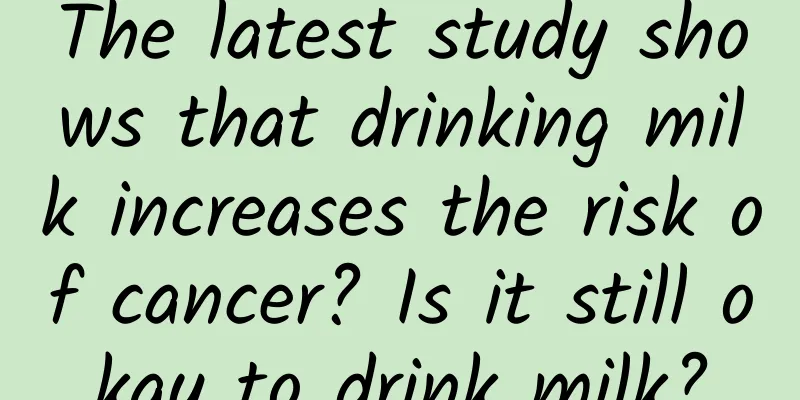The latest study shows that drinking milk increases the risk of cancer? Is it still okay to drink milk?

|
Needless to say, everyone knows the benefits of drinking more milk. However, recent studies have found that drinking milk may actually increase the risk of cancer. A few days ago, an article was published in the journal BMC Medicine[1]. The research team found that based on follow-up survey data of more than 500,000 Chinese adults: Higher dairy intake has been associated with a higher risk of liver cancer and breast cancer in women. In other words, the more milk or dairy products a person consumes, the more likely they are to develop liver cancer and breast cancer. New study: Dairy intake linked to cancer risk in Chinese adults The study involved more than 500,000 people, a relatively large sample size. The participants were aged between 30 and 79 and came from 10 different regions across the country (5 urban areas and 5 rural areas). The researchers collected information on the frequency of consumption of major food types, including dairy products, through questionnaires and found that 20.4% of people frequently consumed dairy products (at least once a week), with an average daily consumption of 80.8 grams; 68.5% never or rarely consumed dairy products, with an average daily consumption of 37.9 grams of dairy products. The researchers found that regular consumption of dairy products increased the risk of overall cancer by 9%, liver cancer by 18%, and female breast cancer by 22%. For every additional 50 grams of dairy products consumed per day, the risk of overall cancer, liver cancer, and female breast cancer increased by 7%, 12%, and 17%, respectively. Some people question whether the research results obtained in this way are too simplistic and crude, or whether the increased cancer risk is caused by other reasons. The researchers have tried to eliminate confounding factors, including age, region, education level, family income, smoking, drinking, physical activity, family history of cancer, body mass index (BMI), soy and fresh fruit intake, and chronic hepatitis B virus infection (for liver cancer). (However, in fact, it is difficult to eliminate the influence of other interfering factors by random questionnaires) After adjusting these factors that may cause confounding effects, the final result was: dairy product intake was significantly positively correlated with the risk of cancer! That is to say, regardless of the relevant factors, excessive intake of dairy products may make people more susceptible to cancer, especially liver cancer and breast cancer. Image source: Reference [2] Are there no "loopholes" in this study? Does this study have any "loopholes"? Of course, any study has limitations. For example, the study did not include enough cancer cases to be generalized to the entire Chinese population, nor was it possible to conduct reliable statistical analysis on less common cancer types, such as lymphoma and prostate cancer. At the same time, this study is an observational study rather than a randomized controlled trial, and the observed association cannot be used to determine a causal relationship between dairy intake and cancer risk. If a randomized controlled trial is conducted, the causal relationship between dairy product intake and cancer risk can be confirmed. The specific operation is to randomly assign the experimental subjects who meet the requirements to the experimental group (consume a certain amount of dairy products) and the control group (do not consume dairy products), conduct the study under consistent conditions and environment, and after a period of time, conduct cancer screening on the experimental subjects, calculate the cancer incidence rate, and conclude the causal relationship between dairy product intake and cancer risk. Of course, such research is unethical to some extent. The subjects may say to the researchers, "You assumed that drinking too much milk would cause breast cancer, and you asked me to participate in the experiment. Are you still human?" Therefore, the causal relationship and underlying mechanism between dairy product intake and cancer risk need further research and exploration in the future. So, should we still eat dairy products? In fact, before this paper was published, there were already many studies on dairy products and cancer risks. For example, a previous study mainly targeting Western populations showed that excessive intake of dairy products increases the risk of prostate cancer. We can find in the literature how much intake increases the risk of prostate cancer [2]. Some studies have also pointed out that dairy products have a protective effect on the incidence of colorectal cancer, that is, consuming a certain amount of dairy products can reduce the incidence of colorectal cancer [3]. The authors of this study remind us: Although our results suggest that there may be a direct link between regular consumption of dairy products and certain cancers, it is important to realize that the protein, vitamins and minerals contained in dairy products are very important for health. It is unwise to refuse the intake of dairy products based solely on the results of currently unverified studies. " The latest "Dietary Guidelines for Chinese Residents" recommends that adults consume 300-500 grams of milk and its products every day. In fact, the Chinese intake is far from reaching this amount, with an average of only about 30 grams. For now, it is more important to drink the recommended amount. Of course, as the saying goes, "too much is as bad as too little." Excessive intake of milk and dairy products will not only bring no benefits to the body, but will also increase the burden on our body, may lead to obesity, and trigger the risk of various diseases. If you want to supplement protein, you can also choose to drink soy milk and milk alternately. Although the calcium and protein content in soy milk is not as high as that in milk, it can also provide a certain amount of high-quality protein, and it is rich in unsaturated fat, which is good for cardiovascular health. References: [1] Maria K, Du H, Timothy K, et al. Dairy Consumption and Risk of Cancer: An 11 Year Prospective Cohort Study of the China Kadoorie Biobank[J]. Current Developments in Nutrition, 2021(Supplement_2):Supplement_2. [2] Dagfinn A, Navarro R, Chan Doris SM, et al. Dairy products, calcium, and prostate cancer risk: a systematic review and meta-analysis of cohort studies[J]. American Journal of Clinical Nutrition, 2015(1):87-117. [3] Laura B, Nancy B, Nerea BT, et al. Association Between Dairy Product Consumption and Colorectal Cancer Risk in Adults: A Systematic Review and Meta-Analysis of Epidemiologic Studies[J]. Advances in Nutrition, 2019(suppl_2):suppl_2. [4] Yin Mingjie, Wu Dan. On the close relationship between the nutritional value of milk and health[J]. Animal Husbandry and Veterinary Science and Technology Information, 2021. END Audit expert: Wang Guoyi, Postdoctoral Fellow in Food Safety Tadpole Musical Notation original article, please indicate the source when reprinting Editor/Heart and Paper |
Recommend
When we played music on a mountain destroyed by fire, something magical happened
We have all listened to the sounds of nature, whe...
After Yangkang, will exercise lead to sudden death from myocarditis? How long can I exercise?
Can I resume exercise immediately after “Yang Kan...
Can you spend the New Year peacefully by developing a small program? You may be overthinking
Open Baidu Index to check the keywords of " ...
Most people don’t know how unhealthy puffed foods are
Puffed food is a new type of food developed in th...
How powerful will smart equipment be in subverting future battlefields?
Recently, a number of my country's unmanned i...
What amazing skills do sea snails, known as “global travelers,” have?
Author: Liu Yi Source: Knowledge is Power Magazin...
Hello! My name is Xiaoqiang...
I suddenly woke up from the darkness, and a force...
iOS16 public beta is released, you can try it, but pay attention to some details
Although the iOS16 beta version has been launche...
Notre Dame de Paris is about to be "reborn", and this "wall-climbing" game has a role to play in this?
Audit expert: Wang Shengwei Beijing Municipal Eng...
Mobike, a detailed explanation of user operation growth strategy based on the WeChat ecosystem!
How does an ordinary user use Mobike ? I thought ...
Gartner: Global enterprise IoT adoption is expected to reach 43% in 2016
Social media connection concept with mobile, note...
How to create tourism advertising in information flow during the Qingming and May Day holidays?
When the targeting conditions are almost the same...
The 9th Aiti Tribe Technical Clinic
【51CTO.com original article】 [51CTO original arti...
Tips for APP promotion, double the effect!
Many optimizers often encounter such troubles dur...
Would you still love the new generation of Jeep Compass if it looks like this?
Recently, Jeep officially released the official p...









